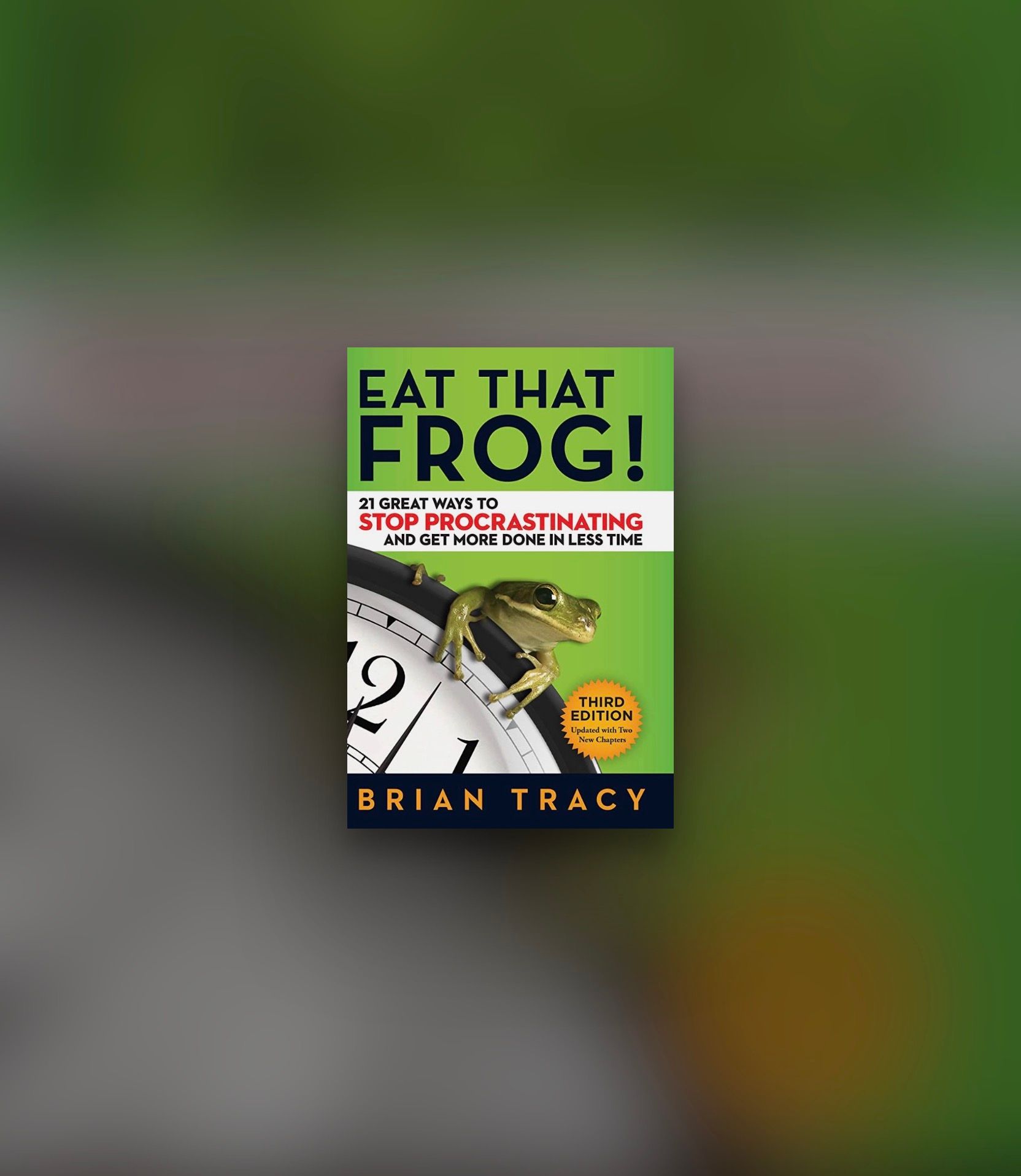Eat That Frog by Brian Tracy

Introduction:
In a world where there's a lot to do, it's important to choose what's most important. Brian Tracy says we should start by doing the biggest and hardest task first thing in the morning. We shouldn't stop or take a break until it's done. He called it "eating the frog," which means doing your most important task.
To create and form a new habit, there are three important things (D’s) to remember:
- Decision - decide to complete tasks and make it a habit.
- Discipline - practice and learn until it becomes easy and automatic.
- Determination - keep trying and don't give up until the habit becomes a part of who you are.
Lastly, imagine yourself as the person you want to be. What you imagine can come true if you believe in it.
Psst! 📚 Just so you know, the link below is an affiliate link. If you use it to snag this fantastic book, I get a little kickback. Helps keep the bookshelves full without costing you extra! Happy reading! 🌟 📖

Table of content
- Chapter 1: Set the Table
- Chapter 2: Plan Every Day in Advance
- Chapter 3: Apply the 80/20 Rule to Everything
- Chapter 4: Consider the Consequences

Chapter 1: Set the Table
Have clarity about what the purpose is, what you want, and why you want it before you start eating your frog.
The best way to do this is to think and write on paper.
“Think on paper”
Here are seven simple steps for setting and achieving goals in life:
- Step 1: Decide exactly WHAT you want. 🎯
- Step 2: ✍️ WRITE it down.
- Step 3: 📅 SET a deadline. ⏰
- Step 4: 📋 MAKE a list of everything.
- Step 5: 🗂️ ORGANIZE the list into a plan.
- Step 6: 📝 TAKE ACTION on your plan immediately.
- Step 7: 🚀 DO something every day that moves you towards your major goal. 🏃♂️
“Think about your goals and review them daily. Every morning when you begin, take action on the most important task you can accomplish to achieve your most important goal at the moment.
Note: The idea mentioned here is similar to the concept discussed in the book "The ONE Thing." You can click here to read the book's highlights and notes.

Chapter 2: Plan Every Day in Advance
You will become unstoppable if you have a plan for every day.
- Plan your day ahead of time the night before to prevent wasting time and increase productivity/efficiency.
- Break down big tasks and initiatives into manageable, sequential steps, then start working on the first one right immediately.
- Before you start, make a list of everything you need to accomplish using a piece of paper and a pen.
- Brian suggests that you always work from lists and that you make your lists the night before for the upcoming workday.
Essential Lists:
Suggest making the following four (4) lists:
1/ Create a master list of all the things you wish to do.
2/ Create a monthly list at the end of each month for the following month.
3/ Create a weekly list and prepare your full week in advance.
4/ Transfer things from the weekly and monthly lists to the daily list.
Project:
- To start a project, make a list of all the steps you'll need to take to see it through from beginning to end.
Project Prioritization Technique:
Put the steps in order by:
1/ Priority - what is crucial and important.
2/ Sequence - what actions you need to take and in what order.
You may visualize each step and activity by mapping them out on paper or in a digital planner.
Next, focus on one task at a time.
10/90 Rule:
Follow the 10/90 rule: preparing and arranging your work for the first 10 minutes before you start will save you 90% of the time needed to finish the task.
Quotes:
“Planning is bringing the future into the present so that you can do something about it now." - Alan Lakein
“Taking action without thinking things through is a prime source of problems.”
“Six-P Formula = Proper Prior Planning Prevents Poor Performance.”

Chapter 3: Apply the 80/20 Rule to Everything
80-20 Principle:
- According to the Pareto Principle, 80% of our outcomes and results are produced by 20% of our efforts.

The ONE Thing went into extensive depth on this. To learn more, click here ▲
“Before you begin work, always ask yourself, “Is this task in the top 20 percent of my activities or in the bottom 80 percent?””
“Rule: Resist the temptation to clear up small things first.”
“The hardest part of any important task is getting started on it in the first place.”
“Time management is really life management—personal management. It is really taking control of the sequence of events.”
“Time management means taking control of what you do next. And you are always free to choose the task that you will do next. Your ability to choose between the important and the unimportant is the key determinant of your success in life and work.”
“Effective, productive people discipline themselves to start on the most important task that is before them. They force themselves to eat that frog, whatever it is. As a result, they accomplish vastly more than the average person and are much happier."

Chapter 4: Consider the Consequences
The core concept is that highly successful people have well-defined goals for the next 5, 10, and 20 years.
The decisions and actions taken today are directed at the desired long-term future.
Quotes:
“Rule: Long-term thinking improves short-term decision making.”
Make Better Decisions about Time
The clarity of your future strategy will have a big impact on what you do right now.
With a clear long-term roadmap, you are better equipped to assess a current action to see whether it is in line with your ultimate goals.
Quotes:
“Before starting on anything, you should always ask yourself, “What are the potential consequences of doing or not doing this task?””
“Rule: Future intent influences and often determines present actions.”
Think about the Long Term
Quotes:
“Motivation requires motive. “
“Thinking continually about the potential consequences of your choices, decisions, and behaviors is one of the very best ways to determine your true priorities in your work and personal life.”
Obey the Law of Forced Efficiency
Quotes:
“Rule: There will never be enough time to do everything you have to do.”
“The Law of Forced Efficiency says, “There is never enough time to do everything, but there is always enough time to do the most important thing.”
Deadlines Are an Excuse
- Plan in advance (period).
- Build a time buffer for unexpected circumstances.
- Add 20% to your current anticipated time OR make it your habit to get things done ahead of time.
- This will decrease the stress, anxiety and make you feel calmer and well prepared since you will always be on top of the most important tasks.
Three Questions for Maximum Productivity
Stay focused on crucial activities by asking three key questions.
- “What are my highest-value activities?”
- “What can I and only I do, that if done well, will make a real difference?”
- “What is the most valuable use of my time right now?”
Quotes:
- “The things that matter most must never be at the mercy of the things that matter least.”
- “Only engage, and the mind grows heated. Begin it, and the work will be completed.”
